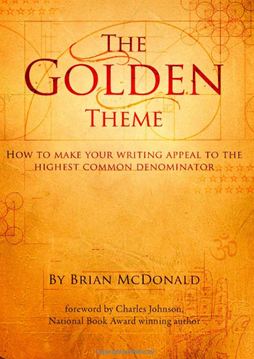 “We are all the same.” This is the core principle of Brian McDonald’s second book, The Golden Theme, and a fascinating exploration into why certain stories resonate with us as human beings.
“We are all the same.” This is the core principle of Brian McDonald’s second book, The Golden Theme, and a fascinating exploration into why certain stories resonate with us as human beings.
This book reads differently than his first book Invisible Ink, which at first surprised me. Invisible Ink feels much like a teaching handbook with insightful exercises and examples. The Golden Theme spoke on a literary level as well, but dug deeper into the heart and emotions of readers and writers on a human level.
The idea of we are all the same is the key message that readers, observers, audience members, etc, latch onto because it is the degree to which they can relate to the story and its players.
When I am able to cry with the heroine over her grief and loss, it’s because I’ve been touched by the fact the she and I are the same, and thus I can share her emotions in relation to my own life.
I was intrigued by the concept of how the villain and the hero of a story must have enough parallels that the audience sees failure in the villain and victory in the hero over the same problem.
This level of hero-villain parallel is harder to write than just crafting a demonized villain who everyone easily hates, but a set-up like this is much more satisfying. It keeps the story human. Villains are not some other brand of beast. They are humans, too. We are all the same.
McDonald points out that style is something that a lot of critics celebrate, and that style may get a writer far, but it will not get a writer deep. Resonating with humans on the human level is what makes something go deep. That made good sense to me.
Style doesn’t tell us that we are all the same. Stories that we can relate to, that speak truths that will help us in our own lives, these tell us we are all the same and these are the things that go deep.
 Stories are medicine. The Greeks thought catharsis was healthy. Even at the end of a tragic story (we know there were plenty of Greek tragedies), the emotions that the wrung-out or even devastated audience felt were still healthy. This impacted me.
Stories are medicine. The Greeks thought catharsis was healthy. Even at the end of a tragic story (we know there were plenty of Greek tragedies), the emotions that the wrung-out or even devastated audience felt were still healthy. This impacted me.
Following the medicine train of thought, McDonald uses the analogy that we don’t want a surgeon to handle the instruments with flair, we want him to be competent with the surgery itself.
The same goes for writing. It should be done with care and precision and the writer should see it as a blend of medicine that s/he is creating and not be as worried about the flair of style. I find this both encouraging and empowering to storytellers.
McDonald sites scientific research that shows how humans learn things in our brains through stories as if we had actually lived them. Our brains make no differentiation between story and real life. Thus, a careful reader and observer of stories has lifetimes’ worth of wisdom to absorb.
This makes the case for good storytelling even more compelling: a poorly constructed story with no survival message purpose is like junk food instead of good wholesome nutrients.
At its core, the message of the Golden Theme explains how we are all the same, how uniting around our commonalities as humans in our storytelling will create impactful and long-lasting results, furthering the lifetime and use of our stories from generation to generation.
This is a great book to read and absorb and ponder. It brings awareness in your writing from a profound angle and it will linger in your mind as you watch its life-derived examples play out in front of you.
If you haven’t checked out Brian McDonald’s blog yet, I highly recommend it. Visit it here.
Do you have a great writing-related book that you would like to recommend or see reviewed? Reply to this with your comment and let me know what book that is.